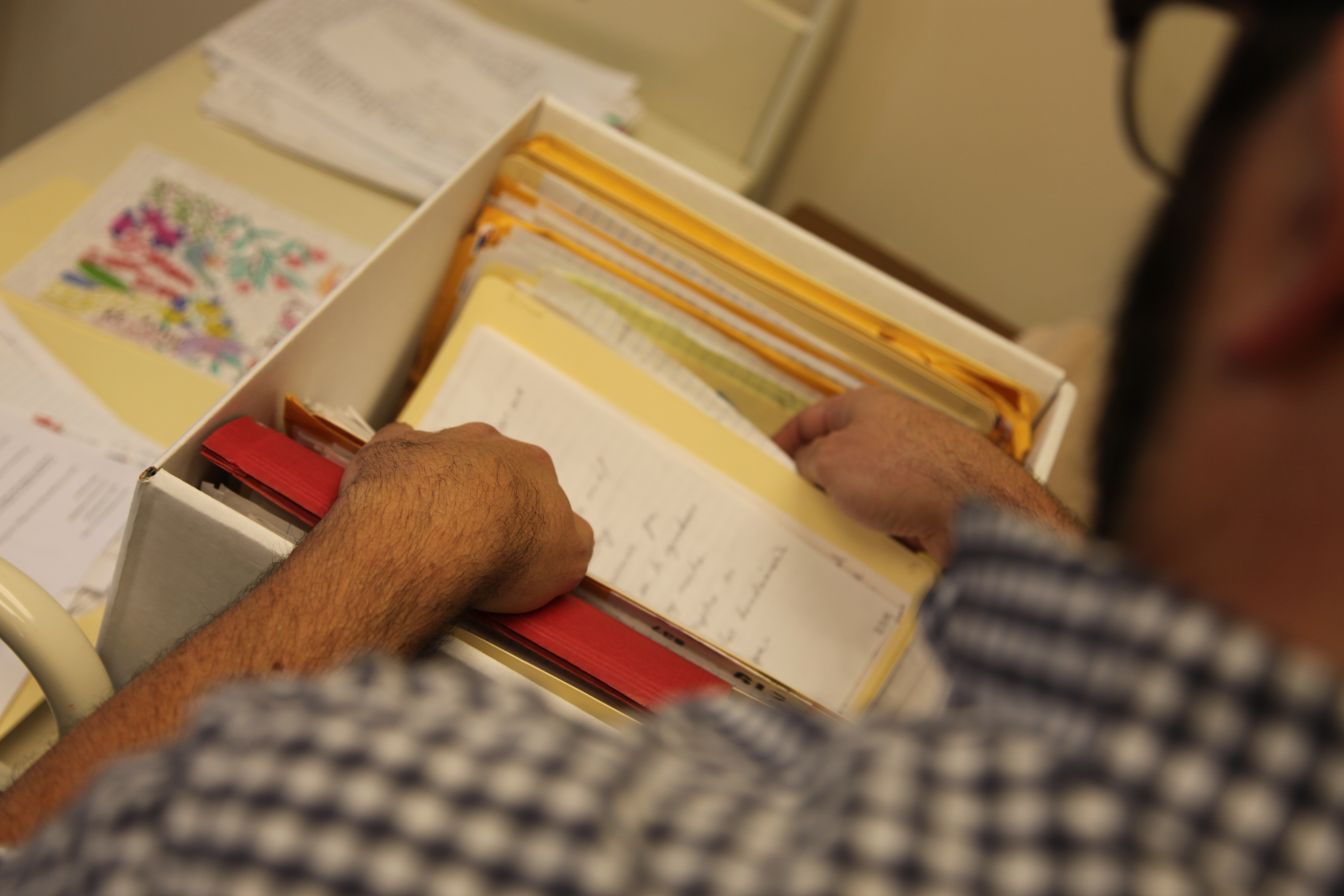Daily Business Report-Feb. 18, 2019
The SDSU Library will continue to upload the handwritten letters to the archive as they are received. (Photos courtesy of SDSU)
SDSU Library archive reveals
detainees’ path to seeking asylum
By La Monica Everett-Haynes | SDSU NewsCenter
What began as a casual gathering of friends has become a first-of-its-kind living archive of handwritten letters shared by hundreds of asylum seekers detained along the U.S.-Mexico border. Those letters, in the collective correspondence, provide a detailed description of each person’s path to pursuing asylum, and the conditions inside detention centers.
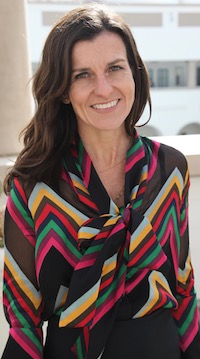
It was the summer of 2018. Joanna Brooks, San Diego State University associate vice president for Faculty Advancement, and Jennifer Gonzalez, a legal communicator with expertise in immigration, had organized with friends and neighbors a grassroots group, named Detainee Allies. The group has provided support for refugees arriving at Tijuana, Mexico, from Central America, at a time when more and more migrants were being held in privately-run prisons.
“We realized that hundreds of refugees were being detained at Otay Mesa Detention Center, just 25 miles south of campus,” Brooks said.
Gonzalez and Brooks, along with colleagues from SDSU, friends and neighbors, sat with the weight of the refugee crisis unfolding at the border. They were deeply saddened but had that heart-and-stomach-felt compulsion that kept saying, “Do something.”
They found a way through the U.S. Postal Service.
At the end of June, SDSU faculty and volunteers with Detainee Allies, wrote and mailed 30 letters to a group of refugees who had arrived from Honduras in May. About one week later, they received more than one dozen letters in return, providing a rare view into their stories of migration and their living and working conditions in real time.
That was the start of the Otay Mesa Detention Center Detainee Letter Collection.
Untold, Unfiltered Stories: Letter by Letter
What began as a basic act of human kindness has evolved to include dozens of students, faculty, staff and community volunteers exchanging letters over months with more than 220 people in detention. While in detention, some have even shared original artwork made from materials from within the detention center in addition to the letters, providing a more complex, first-hand account of the detention facility conditions.
“Both for the SDSU faculty involved and for our volunteers, the goal has always been to lift up the stories of the people inside the black box at the border,” said Brooks, also a SDSU professor of English and comparative literature.
“This is also about finding ways to make our scholarship and research public-facing to be both careful meaningful and to connect human beings to each other,” she said. “This is what we all need now.”
That letter-writing effort has also become a major research and archival project involving the SDSU Library, whose Digital Collections team is digitizing hundreds of pages of letters. All told, more than 500 letters have been exchanged to date. To support the library initiative, which includes continued archiving, a new fund has been established: https://library.sdsu.edu/detainee-letters-donate.
On Feb. 1, the SDSU student and faculty researchers co-released a new report, titled “Testimony from Migrants and Refugees in the Otay Mesa Detention Center,” alongside Detainee Allies. The report details accounts of insufficient food, unsafe working conditions, not having appropriate access to legal representation, access denied to phones and mail, among other conditions. Some migrants describe feeling less than human, describing that they would read and reread letters because they were the only connection they had beyond detention.

“Detainee letters give us a very stark view into the lives of asylum-seeking refugees and migrants now held in American prisons,” said Kate Swanson, an associate professor of geography at SDSU and a co-author of the report. “Letters from detainees who have been moved from San Diego to prisons in other states suggest that these conditions are not unique to the Otay Mesa Detention Center.”
The report has since been shared with the U.S. Department of Homeland Security’s Office of Civil Rights and Civil Liberties and others, arriving as California Attorney General Xavier Becerra is investigating the conditions at all detention centers in the state.
“The stories these refugees tell remind us of the fragility and vulnerability of human communities in the twenty-first century,” Brooks said. “And they show us the humanity of the people in detention.”
A Living, Growing Archive
While the letter-writing initiative began with individuals from Honduras, the collection includes letters written by people from around the world, including countries such as Afghanistan, Brazil, China, Colombia, Cameroon, El Salvador, Ukraine, Mexico, Nicaragua and Venezuela, among others – all of whom are now or have been detained at Otay Mesa
“This is unique archive because it is happening now,” said SDSU University Archivist Amanda Lanthorne.
The SDSU Library continues to digitize each individual letter as part of the new archive. The letters have been redacted to protect the identity of their authors.
“Because we are committed to information literacy and lifelong learning, and creating global citizens, it is imperative to archive these detainee letters and make them available,” said Patrick McCarthy, interim dean of the SDSU Library. “They will inform current and future conversations about immigration, refugee culture, the lives of migrants and asylum seekers, and San Diego as a key player in these interwoven topics.”
In conjunction with the release of the report, the first digital copies were made available on Feb. 1 via SDSUnbound, the university’s digital repository, providing access to students, journalists, researchers, government officials and members of the general public.
“The collection will provide valuable primary source data for scholars today and for years to come,” McCarthy said. “Library archives play a critical role in democratic societies by collecting, preserving, and providing access to the written memory of humankind. We are committed to adding these stories to our archives because ultimately their stories are our stories.
___________________
Port of San Diego awards second contract
for Tenth Avenue Marine Terminal Project
The Board of Port Commissioners has selected a local contractor to begin demolishing a second transit shed and other work under the first phase of the Port’s Tenth Avenue Marine Terminal Redevelopment Project. The board awarded a nearly $8 million contract to Dick Miller Inc. of San Marcos.
The scope of work to be completed includes: demolition of the second of two obsolete and underutilized transit sheds and a head house located adjacent to three of the terminal’s eight primary vessel berths; disposal and salvage of the transit shed building and components; the excavation, grading and compaction of the areas under the demolished buildings to support new pavement; site utility improvements; stormwater BMP improvements; and rail improvements consisting of a rail lubricator system and air compressor assemblies.
Construction is anticipated to begin in April 2019 and be completed in April 2020.
The federal government has provided a $10 million TIGER grant from the U.S. Department of Transportation. With a $14 million Port contribution, the combined budget is $24 million.
___________________

Self-driving startup TuSimple
grabs $1 billion valuation
San Diego Union-Tribune
A San Diego startup that makes self-driving trucks — and the powerful software that runs them — has just landed a $95 million round of venture backing, making the company worth roughly $1 billion, according to its investors. TuSimple, founded less than four years ago, is rapidly expanding at their local office and abroad. The company employed just 50 people in San Diego a year ago. By the end of this summer, they plan to employ 150 at their local office. “That’s a pretty definite number,” said Robert Brown, who heads up public affairs at TuSimple. “We’ve already signed the lease.”
___________________
New homeowner association
law firm formed in Carlsbad
Delphi Law Group LLP has been formed in Carlsbad by four homeowners association attorneys — Kyle E. Lakin, James R. McCormick Jr., Christina M. Baine DeJardin and Zachary R. Smith — to provide legal services to private communities throughout Southern California.
The four partners, who have over 70 years of combined legal experience, including over 50 years of experience providing homeowners associations with corporate counsel and litigation services, are committed to serving the needs of condominiums, townhomes, high-rises, mid-rises, and planned unit developments.
“We have an established history as a team valuing our client relationships and striving to support their needs by providing superior service whether the community association has five residences or more than 3,500 residences,” said McCormick. “Throughout our professional experiences we have focused on honest problem solving, and careful planning to avoid potential issues that can arise. We offer clients responsiveness and a collaborative and straightforward approach that is the foundation of our firm.”
Delphi Law Group LLP’s offices are located at 1901 Camino Vida Roble, Suite 100, Carlsbad.
___________________
Co-working space for women opening in Temecula
Female-focused coworking space and business accelerator Hera Hub has signed a new licensee in Temecula, the company’s eighth location in the U.S., which founder Felena Hanson says will further its mission of supporting over 20,000 women in the launch and growth of their business by the end of 2020.
Leading the expansion into Temecula is Dr. Alisha Wilkins. She is an organizational psychologist who has conducted extensive research on the challenges individuals experience developing psychological connections with each other when communicating almost exclusively through the use of technology.
Wilkins has a long history of building and connecting individuals and communities, and a deep level of knowledge for the unique working environments of remote workers. She has worked on women issues for over 15 years and in her role as an state appointed commissioner to the CA Commission on the Status of Women & Girls, where she serves as chair, continuing her dedication to advancing women through her work on pay equity and girls in STEM.
“I am thrilled to have Alisha on the Hera Hub team. Her passion for supporting women is a big part of the reason we awarded her the license for south Riverside County,” said Hanson.
___________________
SDX extends entry deadline to Tuesday
for San Diego American Advertising Awards
SDX, formerly the San Diego Advertising Club, has extended the entry deadline to Tuesday, Feb. 19, for its 2019 San Diego American Advertising Awards, San Diego’s largest advertising industry competition. Timeframe for entries is work that appeared between Jan. 1 and Dec. 31, 2018.
ADDY awards will be presented March 15 in more than 110 advertising, digital and graphic design categories. Categories include sales and marketing, print advertising, out-of-home and ambient media, film, video and sound, elements of advertising, cross platform and online-interactive, as well as about 30 student categories. This year’s awards program theme is “Fight Night.” Traina Design provided event theme and creative design.
Members of the following local networking groups can enter at the SDX member rate of $120 per entry: Ad 2 San Diego, American Photographic Artists, American Institute of Graphic Arts, International Association of Business Communicators, Printing Industries Association, San Diego American Marketing Association, San Diego Direct, San Diego Media Pros, Society for Experiential Graphic Design. For more information, visit www.sandiegox.org.
Delphi Law Group partners, from left: Kyle Lakin, James McCormick Jr., Zachary Smith, Christina Baine DeJardin.
___________________
Editor’s note: The below commentary is in response to “State law and legislators fail California consumers on high-interest loans,” Feb. 4, 2019, by Tom Dresslar. Get it here.
Commentary:
Online lenders provide innovative
and much needed financial services
By Mary Jackson | Special to CALmatters
Working families feel the strain of making ends meet every day, making it hard to budget for unexpected expenses and other financial emergencies.
In fact, according to the Federal Reserve, four in 10 Americans wouldn’t be able to cover a $400 emergency expense; 38 percent of California households would be unable to cover basic livings costs for three months if they lost their income.
The threat of an expensive visit to the emergency room or an unexpected car repair is even more daunting for millions of Californians who don’t have a prime credit score. Even people with good wages may struggle to get a loan from a bank or a credit union, since non-prime lending by traditional institutions has fallen by $143 billion since 2008.
And more than half of consumers turning to California’s pilot program for small dollar loans are denied credit, often because of a thin or non-prime credit history.
Other options, such as overdraft fees can yield annualized interest rates of well over 1000 percent and can negatively impact customers’ credit.
Californians deserve access to safe, trustworthy credit when they need it. Having access to a range of well-regulated loan options helps soften financial shocks experienced by low- and moderate-income households.
That’s why the Online Lenders Alliance has championed regulations that protect consumers while preserving access to credit and has served as a watchdog to help ensure that reputable lenders and lead generators can serve California customers, while pushing out bad actors.
Lead generators play an important role in providing non-prime consumers access to credit. If you’ve ever purchased a plane ticket on Priceline, booked a room through Trivago, or even shopped for car insurance online, you’ve probably done it with the help of a lead generator. They give consumers more choices, as well as tools to make more informed choices.
Last year, legislation to license lead generators failed because it didn’t adequately recognize the way in which modern lead generation works.
Lead generation, like many other Internet-based enterprises, only came into existence after California’s consumer finance laws were written and don’t fit neatly under current law.
Trying to regulate them like brokers–someone who arranges, negotiates and sells loans–is like trying to regulate companies such as Uber like taxis or Airbnb like hotels. Putting the brakes on the one-size-fits all approach now opens the opportunity to develop regulations that embrace technology while protecting consumers.
Together, online lead generators and lenders provide innovative financial services that reach Californians who aren’t being served by banks and credit unions. Ensuring laws are modernized, embrace innovation and protect consumers should be the Legislature’s top priority.
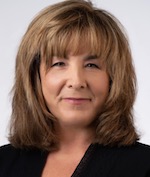
Mary Jackson is chief executive officer of the Online Lenders Alliance, mjackson@oladc.org. She wrote this commentary for CALmatters, a public interest journalism venture committed to explaining how California’s Capitol works and why it matters.

